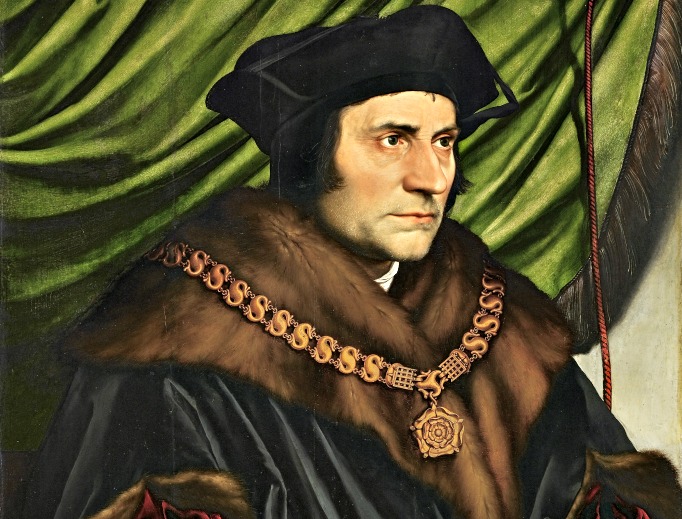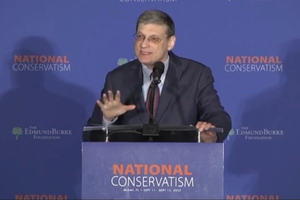Missing More: Catholics and Political Life
COMMENTARY: It is almost axiomatic that many Catholic politicians in both political parties are unwilling to form their consciences properly.

As he sat in the Tower of London awaiting his trial for treason in August 1534, St. Thomas More observed to his daughter, “I never intend, God being my good Lord, to pin my soul to another man’s back, not even the best man that I know this day living: For I know not where he may hap to carry it.”
The patron saint of politicians went to the executioner’s block within a year for refusing to abandon his conscience for political expediency and then not even to save his life. Would that more Catholic politicians might follow his lead.
It is almost axiomatic that many Catholic politicians in both political parties are unwilling to form their consciences properly. Even fewer are willing to act on a conscience formed in accord with reason and the divine law, especially if it means enduring political and social martyrdom.
The issue, for example, of pro-abortion Catholic officials has been brought again to the forefront of an election year by Hillary Clinton’s choice of Virginia Sen. Tim Kaine as her running mate. Kaine has publicly declared that he is personally opposed to abortion but, since his arrival in the U.S. Senate in 2013, has earned a 100% rating on abortion from Planned Parenthood and NARAL.
Kaine is not alone or very novel in professing his private Catholicism while holding a public position that is contrary to the teachings of the Church. What is striking in the 2016 political climate, however, is the way that a faithful Catholic striving to bring a properly formed conscience into the public arena today is accused of imposing dangerous and illegitimate ideas onto the body politic.
All of this was predicted, of course, in a document published in 2002 by then-Cardinal Joseph Ratzinger when he was head of the Congregation for the Doctrine of the Faith, the “Doctrinal Note on Some Questions Regarding the Participation of Catholics in Political Life.” The future pope’s intention was “to recall some principles proper to the Christian conscience,” and it is worth a new reading in light of the upcoming election.
Cardinal Ratzinger did not discourage Catholics from taking part in politics. Rather, he suggested, “By fulfilling their civic duties, guided by a Christian conscience, in conformity with its values, the lay faithful exercise their proper task of infusing the temporal order with Christian values, all the while respecting the nature and rightful autonomy of that order, and cooperating with other citizens according to their particular competence and responsibility.”
At its heart, the document served to remind everyone that political life must be oriented toward promoting the dignity of the human person and the common good, especially in the face of the great threat from moral relativism.
“A kind of cultural relativism exists today,” the cardinal wrote, “evident in the conceptualization and defense of an ethical pluralism, which sanctions the decadence and disintegration of reason and the principles of the natural moral law.” Such relativism ushers into society false claims to complete autonomy in moral choices and a tragic capitulation “to ephemeral cultural and moral trends, as if every possible outlook on life were of equal value.”
The practical effect of all of this is twofold. First, moral relativism tears away at the foundations of democracy by destroying an authentic understanding of the human person:
“The Church recognizes that while democracy is the best expression of the direct participation of citizens in political choices, it succeeds only to the extent that it is based on a correct understanding of the human person. Catholic involvement in political life cannot compromise on this principle, for otherwise the witness of the Christian faith in the world, as well as the unity and interior coherence of the faithful, would be nonexistent.”
Second, faithful Catholics are being pushed out of the public square and silenced in the name of diversity and tolerance. At the same time, moral relativism, under the guise of tolerance, permits self-proclaimed Catholic politicians to confuse the faithful by supporting laws that are diametrically opposed to the dignity of the human person and the common good, which are core principles of Catholic social teaching as well as values of natural moral law. Cardinal Ratzinger’s doctrinal note added: “In the face of fundamental and inalienable ethical demands, Christians must recognize that what is at stake is the essence of the moral law, which concerns the integral good of the human person. This is the case with laws concerning abortion and euthanasia. … Such laws must defend the basic right to life from conception to natural death.” He added other significant issues, including the defense of the family and marriage, the right of parents to educate their children and religious freedom.
Here is laid bare the basic problem confronting Catholic politicians who assert an unwillingness to bring their “personal views” into the arena of public policy. They are both subverting what should be their own properly formed consciences, confusing the faithful and doing a grave disservice to the pursuit of the common good they are sworn to uphold as elected officials.
The note reminded Catholic politicians, “The social doctrine of the Church is not an intrusion into the government of individual countries. It is a question of the lay Catholic’s duty to be morally coherent, found within one’s conscience, which is one and indivisible.”
And then there is the Church’s genuine concern for the well-being of the elected officials themselves. They often live a kind of religious and spiritual schizophrenia that was noted by Pope St. John Paul II in his 1988 apostolic exhortation on the vocation and the mission of the lay faithful in the Church and in the World, Christifideles Laici (and that is quoted in the doctrinal note).
“There cannot be two parallel lives,” John Paul wrote, “in their existence: on the one hand, the so-called ‘spiritual’ life, with its values and demands; and on the other, the so-called ‘secular’ life” (59).
Cardinal Ratzinger’s document then spoke directly to those who claim that acting on a properly formed conscience renders a faithful Catholic ineligible for public service:
“Those who, on the basis of respect for individual conscience, would view the moral duty of Christians to act according to their conscience as something that disqualifies them from political life, denying the legitimacy of their political involvement following from their convictions about the common good, would be guilty of a form of intolerant secularism. Such a position would seek to deny not only any engagement of Christianity in public or political life, but even the possibility of natural ethics itself. Were this the case, the road would be open to moral anarchy, which would be anything but legitimate pluralism.”
Looking at Election 2016, the doctrinal note offers a clear teaching on how a Catholic politician should act as a true public servant, never forsaking foundational principles of moral law for political expediency. It also gives Catholics a means of judging whether their elected officials are working genuinely to promote the human person and the common good. While we cannot expect every Catholic politician to be St. Thomas More, our politics would benefit greatly if we did not miss him so much.
Matthew Bunson is a Register senior editor.
















